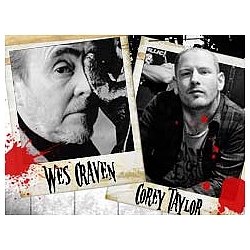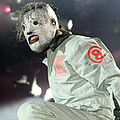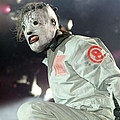Stone Sour and Slipknot frontman Corey Taylor and legendary filmmaker Wes Craven are both eternally uncompromising.
From The Last House on the Left and A Nightmare on Elm Street to Scream and My Soul To Take, Wes Craven has examined darkness at its rawest. He made the world afraid to go to sleep because of Freddy Krueger. Then, he became reflective on Scream, examining the genre itself and his own body of work with sharp wit and wisdom that yielded not only one of the greatest horror films ever, but one of the best movies of all time.
Then, there's Craven's latest flick, My Soul to Take. It's another journey into madness and macabre centering around seven Massachusetts teens all born the night a brutal local serial killer died. The friends share the belief that the killer's soul may be inside one of them, and as the body count rises, the audience is plunged closer to evil than ever before. As a result, My Soul to Take is certainly one of the year's scariest films. The common thread is Wes has never been afraid to dance with devil…
Neither is Taylor. Fronting modern heavy metal's most important band, Slipknot, Taylor unleashes demons with every chart-topping record and sold out show. The Grammy winning, multi-platinum band has become a safe haven for fans worldwide to scream along to, and they've made some of the most intense, introspective and infectious metal ever committed to tape. In Stone Sour, Taylor's reflection is similar to Craven's with the Scream franchise. On Stone Sour's latest offering, Audio Secrecy [Roadrunner Records], Taylor delves deep inside himself and creates some of the most poignant, poetic and powerful music of his career. If that's not enough, he's also got his first book, "Seven Deadly Sins," hitting shelves in March 2011.
For this exclusive "Rogue on Rogue" feature, Corey Taylor of Slipknot and Stone Sour sat down with Wes Craven to discuss discovering horror, My Soul to Take, artistic catharsis, how important music is to film, Scream 4, Audio Secrecy, Corey's book "The Seven Deadly Sins" and so much more. One thing was clear at the end of this conversation with ARTISTdirect.com editor and Dolor author Rick Florino, these two real rogues have a ton in common!
Maybe, we'll see a collaboration one day…until then see My Soul to Take this Friday October 8, 2010 and pick up Stone Sour's Audio Secrecy and Slipknot's new DVD (sic)nesses…
When did you both discover horror?
Wes Craven: I discovered it very late. My upbringing was in a subculture that did not allow movie going, believe it or not. I have no history of having watched movies as a kid, pretty much at all. It was when I was in New York after quitting teaching that I was taken to see Night of the Living Dead by a friend. Before that, I had no concept that there were such kinds of films. I was amazed by how it could be funny and scary. The audience was just going nuts, and I had never seen that kind of energy in a theater before [Laughs]. That was my introduction to it.
Corey Taylor: My mom had taken me to see the Buck Rogers movie with Gil Gerard when I was about five-years-old. The trailer for the original Halloween came on and, for a five-year-old, you'd think I would've ran screaming, but I was mesmerized by it. I didn't even want to see the Buck Rogers movie after that [Laughs]. I was like, "I want to see Halloween!" That's when I really got turned on to the horror genre. Growing up, I got to see so many of those movies that I became an addict from there, especially your movies, Wes. Being raised on them, I loved the fact that you weave your stories into so many different types of horror, from The Last House on the Left to the Nightmare on Elm Street movies. It's been one my favorite genres since I was very young.
Corey, what was the first Wes Craven movie that you saw?
Corey Taylor: The first Wes Craven film that I actually saw wasThe Hills Have Eyes, but the first one I saw in theaters was obviously A Nightmare on Elm Street. The Hills Have Eyes was so cool, not only because of how bizarre the characters are, but because of how crazy it was. I was hooked! [Laughs] I was really intrigued by how far out it was. I got into Nightmare. Being a kid from the suburbs, you had to be into A Nightmare on Elm Street. Then, I saw The Last House on the Left which, to me, is still one of the most disturbing flicks I've ever seen [Laughs].
Wes Craven: Even to me it is [Laughs].
Corey Taylor: That's what makes it work! It's so intense.
Wes Craven: It's extremely intense. I think that's the most real and intense I've been in a horror film.
That intensity is as crucial in Slipknot and Stone Sour as it is in My Soul to Take and The Last House on the Left. How important is exorcising demons and creating a catharsis in both of your respective art forms?
Wes Craven: I have a Master's Degree in Philosophy, and it's interesting that this stuff goes back so far. You can actually trace it back to the earliest stories of this sort. Because the culture can be so over-civilized, the image of America becomes sort of Ozzie and Harriet, and the concept of "Mainstream America" is so out of touch with reality. These kinds of films go into those areas of uncontrolled, uncivilized behavior and potential that has to be recognized somehow. I think horror and rock 'n' roll are very similar in that sense. They've gone into the areas that were not considered polite and were initially banned. I've been doing this for 40 years, and I think it's taken almost that long for them to become legitimate at all, in a sense. Still, the goal is not to be outrageous for the sake of being outrageous but just to get the energy released from the civilization part. That's how I feel at least.
Corey Taylor: I definitely agree. There's almost a renaissance of that. You see people pining for the Eisenhower days where everything was hunky-dory. Well, it really wasn't. Like you said, the great thing about horror is it lances all of that. Horror pulls it back and shows the underbelly. It puts people in that uncomfortable position. Whether the good guy wins or not, you have to show that juxtaposition because nothing is as peachy-keen as it seems.
Wes Craven: That's right!
Corey Taylor: Also from an emotional standpoint, making the music that I've made with Slipknot over the years, the release is so huge. You don't even realize the things that you're holding, bottling up or trying to keep control of, until you either let them out, or it's too late and they explode in a very negative way. There are so many positive aspects to the horror genre and music in general that allow you to let go of the things that you've been sitting on for a long time. It allows you to be a little more alive. One of the lessons that the horror genre teaches is you never know what's going to happen, so live for today. Live in that moment and really embrace life.
Wes Craven: It's true. It teaches self-reliance as well. No matter what you're up against, you have tools very deep inside you, and you can confront the worst things imaginable.
Corey Taylor: Exactly!
Wes Craven: It's very interesting in a strange way.
Corey Taylor: People are stronger than they know. If they can overcome the fear, then they come basically do anything that they want. That's one of the things that I've tried to say in my music. It's honestly one of the things that I've tried to teach a lot of the younger listeners who have grown up with my music. A lot of our fans grow up in these brutal situations, whether it's a terrible childhood or dealing with bullying in school and whatnot. It's very much like those uncomfortable circumstances you were talking about. I try to teach them if they can hold on and get through it, they've got their whole lives to live. If they can stay strong, be positive and look towards the future, they can have everything they ever wanted.
Wes Craven: That's right. I think one of the best things about this kind of music and film is the audience is at that transactional stage between innocence and whatever the hell adulthood is going to be [Laughs].
Corey Taylor: Yeah, that's definitely true!
Wes Craven: It's hard to know you're going to integrate yourself into that world. There's a way you can get through it and a way that you're in tact at the back end. Then, life will settle down a lot. The teen years are pretty wild and ungoverned in many ways. I think kids are probably going through a rougher world physically than they'll ever have to enter, unless they go into combat. You can get through it, but you do have to know that you can face the worst and get through it.
Stone Sour is very introspective and reflective. It's interesting that you've gone from this visceral explosion with Slipknot into Stone Sour. It parallels Wes evolving from Last House into Scream, which is very reflective. How important is looking inside for the both of you?
Corey Taylor: For me, you have to know where you've been to know where you're going to go. The more candid you can be about that and the more ways you can talk about it and let it out, the better off you'll be. With Stone Sour, it was the one area that I really didn't get to do in Slipknot. Whereas Slipknot was the scream therapy, Stone Sour is the meditation or reflection afterwards. With Stone Sour, I've been able to be on the more somber end of things and put things in a better perspective—rather than just the rabid violent side of things. If I didn't have Stone Sour to do that, I might not be as level-headed as I am [Laughs].
Wes Craven: I've certainly been very grateful for the times that I've been able to step out of the genre, whether it's Music of the Heart or Paris, je t'aime. I've found that you can show more than just the crazy, vicious side. There are real human characters in My Soul to Take, and there are moments of solitude and humor. You can include all of those things in your art form, even if you have to change your name or your band name [Laughs]. That allows you to balance yourself. Especially if you're very successful in one thing, you can get caught in that trap. You develop your audience and then, is your audience capable of seeing any other side of you? So many people I know that are involved in that kind of music and horror have 270 degrees that isn't revealed in their films.
The humanity is always there. Corey comes through on every song he's written, especially on Audio Secrecy. Also, Sidney in Scream is a real person.
Corey Taylor: To be quite honest, Sidney is one of my favorite written characters in any genre. I love her. The strength that she has to get over what a lot of people might take as a curse. What she struggles with in Scream 3 is remarkable. To have something like that hanging over you but be able to have that clarity, strength and finally let go of it is incredible. The Scream movies are some of my favorite films ever, in horror or otherwise. I can sit back and watch those over and over again because the stories and characters are so strong. The storytelling method is so great. With Stone Sour, I'm really letting go of everything. I've touched on it in recent years with Slipknot too, but for Stone Sour, it's a bigger rounded platform that allows me to riff on everything. It's definitely helped me move to the next phase of my life and try different things. It's like Wes was saying. There's a real danger of being stereotyped, pigeonholed or painted into a corner from an artistic point of view. I'm maybe one of a handful of people who have been lucky enough to be embraced in different areas, but it is a struggle every day to get it out there and be taken seriously, let alone be successful. When the material's worth it, it's definitely worth fighting for.
Wes Craven: Sidney is one of a series of characters. Similar to Bug in My Soul to Take, she's the person who's innocent at the beginning. Bug finds out a lot about himself in My Soul to Take. By learning what you have inside, you can become stronger. You really can't grow as a person until you know you're roots and who you come from. I think that's a very important process, even for a musician in rock 'n' roll. You have to know what the roots of that are and go back into blues and everything else. For a character that's in a town haunted by a legend, you have to know not only what the legend is but what the realities are behind it. They're central characters, and they're heroes really. They're not superheroes. They're heroes that bleed but, in the end, they achieve something quite extraordinary.
Corey Taylor: I can't wait to see My Soul to Take! Where did it come from for you?
Wes Craven: It's fun! There are seven kids who were born on the night that a serial killer who had seven personalities died. The legend is that he's either going to come back by being inside of one of them, with the assumption that he must've had seven souls as well. The idea is one of the kids is the killer or else they're going to come back and get these kids. The killer was virtually an innocent man, but he had one personality that he didn't know about. That personality would take him over when he went to sleep at night. He'd go out and kill. Then he'd slip back into bed. He didn't realize what he was doing until he discovered it by accident. We have some seven kids, sixteen years later, who believe this man is coming back. It was one of those ideas that came to me all at once, but the story took most of a summer to put down a paper.
Corey Taylor: That sounds awesome!
Corey's forthcoming book confronts the idea of the seven deadly sins, and Wes you've explored sin as well…
Corey Taylor: Well, it's basically my take on the seven deadly sins from a modern standpoint or maybe just a smartass point of view [Laughs]. In the book, I'm making the case that the seven deadly sins aren't sins at all. They're human characteristics and traits that we all experience and share. It has more to do with the stigma of sin sticking to us all, instead of regarding these things as mistakes. We're supposed to learn from mistakes, and we're encouraged to, but sins stick around forever. It's me debunking that and maybe demystifying them, balancing that with some crazy stories from when I grew up and being on the road. I'm saying that I've worked my way through these seven deadly sins my whole life and hopefully I've come out on the other side a better person for it. It's funny and dark, but it tries to make sense of the control that so many different types of organized religions have tried to impose on us by making us feel bad about what honestly is just instinct at the end of the day. I'm essentially calling B.S. and saying, "Hey, wait a minute, without these we don't learn to be better people." In moderation, none of these are actually really bad. It's going to be interesting to see how many people come after me when I release this book [Laughs].
Wes Craven: [Laughs] That's funny! I'm just reading the book God is Not Great about how religion has basically screwed up the world. So when is your book coming out?
Corey Taylor: It's coming out next March. I'm really excited. I've wanted to write a book my whole life. When I got the opportunity to do this, I jumped in with everything I had to make sure it was everything I wanted it to be and more. I just hope people enjoy it.
Wes Craven: Well, I'll certainly go out and buy a copy! It really sounds like a fascinating read.
Corey Taylor: I know the author [Laughs]. I might be able to get you a signed copy...
Wes Craven: It's interesting. "Thou shall not kill" is certainly one of the central edicts we got in our upbringing, especially in the Judeo-Christian tradition. I was raised in the Baptist church. The whole subject of sin was everywhere. In My Soul to Take, the main character's name is Adam. That gives you a clue about going to back to the basics. He's totally innocent. He has to learn to become a man by going through all of the sins himself and learning how to kill in order to survive. He learns what the lies were and how to recognize a lot of these "sins" or whatever you want to call them. It's a way to power, but it's also a way to loss of innocence. You can't have one without the other. Quite often, these things that we're told not to do are very powerful, and that's why they're made into something you're never supposed to do. The powers-that-be don't want you to be too powerful and unpredictable. I think it's a fascinating subject. In order to get to the bottom of things, all creative people know you have to go through the whole sin list yourself personally.
Corey Taylor: Definitely! I'm out of mind so excited about Scream 4. Can you tell us about it?
Wes Craven: We just wrapped about a week ago. It's perfect timing to go out and talk about your new film, when you just finished shooting your last one [Laughs]. We're under a big cloak of secrecy, so we can't really talk about it very much at all. Of course, Neve Campbell, Courtney Cox and David Arquette come back, and we have a whole new cast of young characters. We had a great time, and there are a lot of fun things in it. You'll just have to wait!
Corey Taylor: I will gladly wait! I'm a huge fan of those movies, so I'm looking forward to it very much. Wes, what's your take on music in horror movies? Music is so important to creating the tension in the horror genre. It's almost like the uncredited second star. In A Nightmare on Elm Street, that music would come in, and you'd know something was going to happen. That's what got me into horror. How important do you think music is to creating those beats in the movie?
Wes Craven: I think it's enormously powerful. There's a famous about John Carpenter. This woman said, "I can't watch your films!" He walked over to the VCR and turned off the sound. He asked, "Now, how do you feel?" She responded, "I'm not afraid now." He said, "Exactly!" [Laughs] You create a whole new world with sound in a film. In the Scream series, finding Marco Beltrami was great. He was a sampler. He hadn't composed anything yet. He had a sample CD of three pieces, and my assistant found it on an online chat room mention of him saying, "You should listen to this guy!" I heard that, and we hired him almost immediately as the composer for the film. He captured the world that we created in sight and sound effects with music that made the film take a huge leap up. You can't underestimate the power and importance of score and of tracked music, as we call it. Getting the rock sound into a film appropriately is powerful. In the original Scream when Sidney is in the bedroom with her boyfriend, he plays that cover of "Don't Fear the Reaper" on the radio, and it has an incredible effect on the scene. That effect wasn't there before we tried the song. I'm a huge fan, and I listen to music all the time. Slipknot should be doing the score of a film! It's incredible rock music. I bust all of my computers with the amount of music I cram into them. I'm always looking. Even on My Soul to Take, I found the three rock songs myself. You're always looking for that sound that's new and has something unique about it that fits your film.
Corey Taylor: I couldn't agree more! Music is almost instrumental in creating that. It's important in making that tense moment happen. That shows you the mastery of music especially from people who are really good at it. I love the music in all of the Scream films. Using Nick Cave in Scream was great too. He's one of my all-time favorite artists. Hearing him in there, I was like, "That makes so much sense!" It was really cool.
Wes Craven: I think Nick Cave's music is so akin to your sensibility of music and the sensibility of Scream under the darker side of the American experience. It fit in there so beautifully.
Corey Taylor: Definitely! I wanted to thank Wes for taking the time to do this. It's been an absolute pleasure. I look forward to doing something like this in the future!
Will you be seeing My Soul to Take this Friday? Would you like to see Wes and Corey work together?
For more with Corey check out our most recent interview on Audio Secrecy here!
Check out our first "Rogue on Rogue" featuring Korn and Michelle Rodriguez here!
Corey Taylor news










